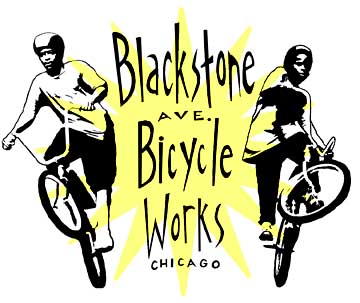
Blackstone Bike Co-op / monk parakeet / Dan Peterman and the Resource Center
6100 BMX
Twenty-five years ago, the demolition of an abandoned apartment building opened up two parcels of land at the corner of 61st and Dorchester on Chicago's southside. As the surrounding neighborhood declined and values plummeted a multifacted environmental collective, which would eventually become Chicago's oldest and largest private non-profit recycling company, bought the land and began operations. A portion of this land was at that time dedicated to urban gardening.
Ten years later, the entirety of these two parcels was turned into community gardens, fruit trees were planted, and an intensive organic soil buildup began. A gardening community of nearly 100 people formed. Most were local residents. The gardens were clearly beginning to improve the quality of life in this small corner of the City.
Two years ago, the bottom of a thirty year pattern of abandonment and disinvestment was reached in the surrounding Woodlawn neighborhood, and aggressive re-development began. The two parcels of land, now richly inhabited by gardens and fruit trees, was targeted and acquired by the City of Chicago as land for a public school expansion.
On a warm June afternoon just weeks prior to the "environmental remediation" which would destroy the gardens and replace them with crushed limestone and chain-link, an energetic project sprang to life. A BMX track was cut into the overgrown vegetation. A borrowed bobcat tractor made the initial pass and the track was fine-tuned by enthusiastic teenagers. Blackstone Bicycle Works, a local youth education bicycle program, took over track operations and organized training sessions and an elaborate day-long competition. The event was a stunning success. A week after the competition the jungle track was razed.
Thanks to:
Andy Greg and staff of Blackstone Bicycle WorksThe Resource Center
Thasnai Setheseree
Jake Spicer
The Baffler Magazine
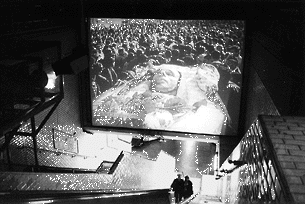
Michael Blum
This Amsterdam based artist has been doing public projects for several years. Last year he installed a video in the Paris subway system. Michael's video, Expect the World, takes the New York Times and its ratio of violent images to 'happy' advertisements as its point of contention. The video shows black and white stills of violent images taken from the NY Times that fade in and out of each other. The captions have been removed. Slogans from ad campaigns scroll across the images of abject horror. In the background ominous music from Aphex Twin plays. The effect is stunning. The realization of the installation barely survived attempts at censoring it.

Biotic Baking Brigade
This group has factions all over the world. They pie public officials and corporate CEOs. Their public pie-ings fall somewhere in between slapstick and direct action. Pies are thrown in an attempt to bring attention to abuses of power and corruption and to draw attention to important struggles. Video activists Whispered Media have produced a video called "The Pies the Limit" that documents the BBB's public pie-ings.
The image is of Bill Gates after being pied by the Biotic Baking Brigade.
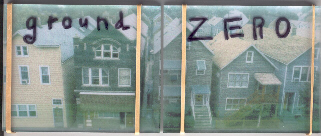
Jim Duignan / The Stockyard Institute / Children from the
Back of the Yards Neighborhood
Gang-proof suit
Description: The development of this project was initiated through a series of conversations with a group of youth in the Back of the Yards community of south Chicago. We have directed our explorations to address and confine selected conditions (power, violence, poverty) of the young people's lives as a primary subject of study.
To advance the term mediation as witnessed in their popular culture, often we must acquiesce to the place youth are positioned in school. This space continues to remain passive and inconsistent with the necessary skills to interpret their experience. Support for an authentic voice has always had an irresolvable place on the street, a prerequisite to some interaction that remains the only respite to a kind of freedom to authentic communication. What is evident, however, is the illusion that exposure to a visually charged environment stands in for some understanding of (reading) information. Curriculum is not knowledge nor is it accountable, residing with some comfort at the pace of the printed page. Children are murdered and their visual landscape and any genuine means for exploration is non-academic, discursive, yet disposable.
Stockyard Institute: We are examining the community as an 'underground', not in as much a sanctuary from pet dispositions, but, a center for visual studies and activism. This project [GPS] is not a singular reflection on a disorder nor is it a documentary of works cited simply through moderate descriptions and the images that stand in for them. It is a deliberate examination of that space in between. A space that requires study of what remains inescapable versus what is critically important. Our work operates through conversations.
The future is not in our sites. It appears comfortable to speak of our urban spaces as under siege, panning the homes of families, churches, centers, and intersections they all share, communicate from, compromise, and struggle to work things out. This is outdoors, an objective landscape of sorts, brutally vital, activated and appropriately not responsible to both school and personal safety. Comfort is located in brief encounters and intimate connections, a pathology disproportionate (to) from a distance of these youths' descriptive life. This community's press is unreported, only defined as home, often only acknowledged by what it cannot accomplish. The architectural lines of demarcation are still evident, fixed not by the infrastructure of some metropolis, but internalized from learning to walk the street, still bordered, families compartmentalized by rivalries, mobility portioned off. The youngest children have been taught to walk a different way. Bipedal development and warfare fight for the same assumptions of self-hood, informing personal histories and testimony to what will suggests inherent, biological functions. Eyes scan the streets urgently and with a kind of completeness, witnesses to a landscape.
The 'gang proof suit' has illuminated the promise of dialogue that has been as elevating as it has been ironic. Questions of mobility, safe passage, police protection, and the deadpan deliveries of murdered friends, brothers, and cousins pointedly marked and intersected our conversations with a casualty of each event detailed.
The drawings, sketches, photographs, found images, film stills, schematics, and data assisted while placed strategically on the wall, are more consistent and visually reminiscent of a military maneuver than a critique.Collectivo Cambalache
Their name translates to "Collective Exchange." Exchanges are an extremely
important component of this group's work. We are presenting documentation
of two recent versions of projects they did in San Juan, Puerto Rico. These
projects have existed in other forms in Barcelona and in Bogota.
Street markets that used to exist in Bogota, Colombia inspired their Museo de la Calle. Recycled and re-used items are placed out in a square or on a sidewalk. People are welcome to exchange items, but can not use money in the exchange.
The other project we are presenting documentation of is El Dibujo 24hs. This project created a 24-hour drawing center in a square in San Juan. People would come and could request that a drawing be made and sent to them at a later date. Often, people would just sit down, start drawing themselves and engage in long conversations. This version lasted for 3 days straight with many drawings being made and displayed on the sides of the shed.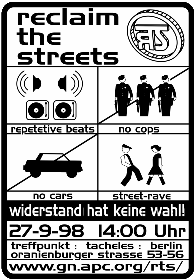
Reclaim the Streets
A non-hierarchical "disorganization" committed to reclaiming control of democracy by first reclaiming that most public of public spaces, the street. Large raves and demonstrations collide in intersections of cities. Traffic is stopped and a show of opposition gets underway. Chunks of asphalt are removed and trees are planted. RTS operates in London, Berlin, New York and many other cities. It is a powerful response to global homogenization and corporate threats to freedom.
Tapando para ver (roughly translates as "covering up in order to see") is a project that Chemi has been doing in public for a long time. He alters advertisements (in every form) by covering up parts with contact paper to "make them reveal what they are really saying."
This ecological group is based in the Pilsen neighborhood in Chicago. They focus on urban ecological activism and raising awareness among the working poor. They have developed a living machine that can easily be installed in a closet. It is a system that recycles water efficiently while raising plants and fish for food. They help people install these systems in their homes. They also provide basic ecological instruction and advising.
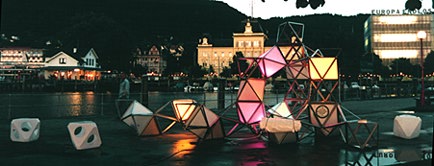
N55
This Copenhagen-based artist collective once held alternative voting to the Danish national elections on the same day. They have made devices that they call PUBLIC THINGS. They place these units in public places to alter the way those spaces get used opening them up to a myriad of new possibilities.
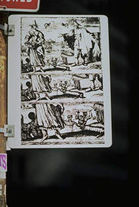
REPOhistory
Their "Lower Manhattan Sign Project" reinstated the erased histories of
locations of struggles for economic, sexual, racial and other kinds of justice
and equality. They used signs to mark places in NY where gentrification and
corporate culture had effaced any trace of the important events.
Taken from their web site: Perhaps the best way to describe the objective for this project is illustrated by this sign (pictured above). Lower Manhattan is filled with official historical markers. A sign marks the the site of the first outdoor Stock Market. The Slave Market, located across the street, was unmarked until the REPOhistory sign. In 1746 the New York Slave Market was the 2nd largest in the country.
Artists: Tess Timoney & Mark O'Brien.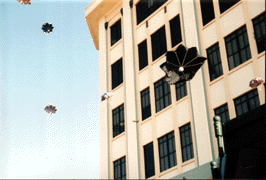
Jorge Rivera
ParacaÌdas (parachutes made from old umbrellas and tennis
balls) were dropped by the hundreds onto a square in Old San Juan creating
a stunning aesthetic intervention into the regular uses of the space. Jorge
Rivera has done several versions of this project. The effects of this project
were immediate and caused an incredible amount of joy and confusion in the
square.

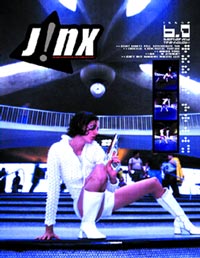
UE - Urban Exploration
Infiltration was an early, if not the first, zine to appear that documented and articulated UE. UE is the practice of going into places that, for whatever reason, are forbidden to the general public. Infiltration gives advice on the exploration of off limit areas. It documents journeys into sealed missile silos and abandoned subway tunnels. It gives tips on gear to take and what to do if caught by law enforcement. The past few years have seen an explosive increase in this activity. UE is practiced in cities all over the world. Jinx magazine is another chronicler of UE and copies will be presented.
Reverend Billy
Part performance artist, activist and stand up comedian, Reverend Billy assaults passive yuppies as they sip lattes in Starbucks or shop in the Disney Store. He engages in what he calls cell phone opera to have "conversations" that are loud and highly critical of the institution he finds himself in. Sometimes his actions lead to outright preaching from the tops of tables. Documentation of Billy's invasions and innovative theater will be presented.
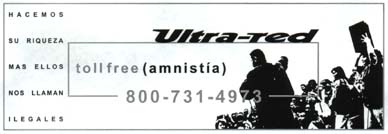
Ultra-red
Founded in 1994, Ultra-red are audio activists producing radio broadcasts, performances, recordings, installations and public actions (or public space occupations). The group's work radicalizes the conventions of electro-acoustic and ambient music to explore acoustic space as enunciative of social relations. With a fluid membership determined by collaborations between electronic musicians and grass-roots political groups, Ultra-red have developed projects around a variety of urban ambiences including needle exchange (Soundtrax, 1996), public sex (Second Nature, 1999), public housing (Structural Adjustments, 2000), issues around globalization (Value System, work in progress) and labor (Social Factory, work in progress). Ultra-red have released CDs and albums on Comatonse Recordings (Oakland, California), Mille Plateaux (Frankfurt, Germany), True Classical (Los Angeles) and Beta Bodega (Miami).
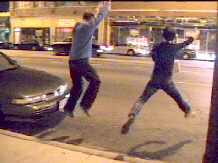
Elyce Semenec
The video, titled Audition, is a documentation of auditions for a
"musical" which will be performed in Nov. through the Spareroom (a venue
for performance and other time arts). The bulk of the auditions on the video
take place at the site of the future performance, a traffic median on North
Ave. & Western. Other auditions are held in the Home Depot parking lot
(also North Ave.). All rehearsals for the "musical" will take place in public
spaces such as alley ways, parking lots, and as it gets colder we will move
inside libraries and stores with large aisles such as Home Depot or Whole
Foods.

Paul Chan
The S8 CD-ROM is an interactive, browser based piece based on material that was produced by the NYC - Independent Media Center during the Mobilization against the United Nations Millennium Summit in New York City in early September 2000. The NYC-Independent Media Center, like the other 40 IMC's around the world, let's anyone on the internet "publish" their reports, photos, sounds, and videos about protests and actions of civil disobedience online and to the world. The CD-ROM project--the first of it's kind--seeks to complement the speed and ubiquity of the web presence by "re-representing" the material on CD-ROM to provide a vital interactive narrative to this event and the development of this new political movement. The CD-ROM includes reports from inside and outside the UN Millennium Summit, photos and videos from the actions on the streets of Manhattan, MP3 clips from Radio-IMC DJs and interviews, and Fidel Castro's speech on the dangers of Globalization and the promise of a new global political movement."
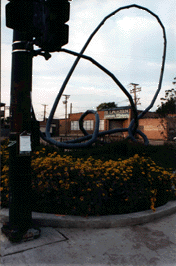
Temporary Services
We started a project in late August in response to a public sculpture by
Chicago artist Josh Garber. This abstract sculpture was plopped down at the
corner of Grand and Western without consulting anyone in the neighborhood.
We put out three clipboards. Each clipboard had three images, different views
of the sculpture, at the bottom. The clipboards held pads of paper. Each
sheet had the question "What is your opinion of this sculpture and why do
you think it was placed in this neighborhood?" written on it. In two weeks
we received over 100 responses - a clear indication that people do have strong
opinions and should have been included in the decision making process. We
will present all of the responses and a booklet documenting this project.
Copies of the booklet will be distributed in front of the sculpture and sent
to the Department of Cultural Affairs.
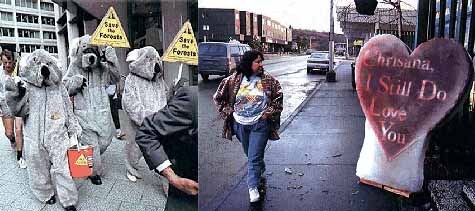
Slide show and wall of archived images compiled by Temporary Services
We collect images from a wide range of sources as well as take our own slides of strange public phenomena. This growing archive contains everything from people that have rebuilt trucks in trees to others that have developed ways to bake messages onto asphalt.